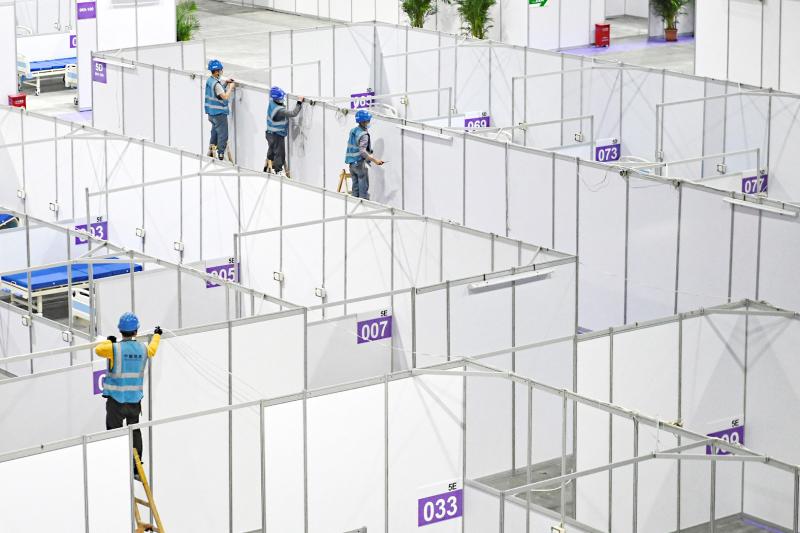The manufacturing hub of Guangzhou yesterday closed itself to most arrivals as China battles a major COVID-19 surge in its big eastern cities.
Shanghai has taken the brunt of the surge, with another 26,087 cases announced yesterday, only 914 of whom showed symptoms. The city of 26 million is under a tight lockdown, with many residents confined to their homes for up to three weeks.
No such lockdown has yet been announced for Guangzhou, a metropolis of 18 million northwest of Hong Kong that is home to many top companies and China’s busiest airport.

Photo: Reuters
Only 27 cases were yesterday reported in the city.
However, primary and middle schools have switched to online lessons after an initial 23 local cases were detected last week.
An exhibition center was being converted into a makeshift hospital after authorities earlier said that they would begin citywide mass testing.
Only citizens with a “definite need” to leave Guangzhou can do so, and only if they test negative for the virus within 48 hours of departure, city spokesperson Chen Bin (陳斌) wrote on social media.
China has stuck to its “zero COVID” strategy of handling outbreaks with strict isolation and mass testing, despite complaints in Shanghai over shortages of food and medical services.
The government and the entirely state-controlled media are growing increasingly defensive about complaints over COVID-19 prevention measures, censoring online content and rebuking foreign critics.
Chinese Ministry of Foreign Affairs spokesman Zhao Lijian (趙立堅) on Sunday said that China had “lodged solemn representations with the US,” after the US Department of State advised Americans to reconsider traveling to China due to “arbitrary enforcement” of local laws and COVID-19 restrictions, particularly in Hong Kong, Jilin Province and Shanghai.
US officials cited a risk of “parents and children being separated.”
China was “strongly dissatisfied with and firmly opposed to the US side’s groundless accusation against China’s epidemic response,” Zhao said.
Despite that, and indications that the hardline policy is being dictated by Chinese President Xi Jinping (習近平), China has rejected any notion that its response is political in nature.
Xi has demanded social stability above all else in the run-up to a key Chinese Communist Party congress later this year at which he is expected to bestow on himself an unprecedented third-term as party leader.
The English-language China Daily said that Shanghai’s measures are “far from perfect,” and pointed to the firing last week of three local officials for failing in their duties.
However, it said that should not become an “excuse to politicize the event and blame China.”
Despite the large number of cases, no new deaths have been reported in the Shanghai wave, possibly because the Omicron variant of SARS-CoV-2 is less deadly than older variants.
City authorities also say they have secured daily supplies for residents, after complaints about deliveries of food and other necessities.
Residents have resorted to group buying of groceries, because they are not allowed to leave their buildings, with only partial success in obtaining needed items.
Beijing has seen relatively few restrictions, although the Erjiefang neighborhood, including the famed 798 Art District, has been cordoned off and classified as high risk after eight infections were reported there over the past two weeks.
China is facing one of its worst local outbreaks since the COVID-19 pandemic began, and is still mostly closed to international travel, even as most of the world has sought ways to live with the virus.

‘EYE FOR AN EYE’: Two of the men were shot by a male relative of the victims, whose families turned down the opportunity to offer them amnesty, the Supreme Court said Four men were yesterday publicly executed in Afghanistan, the Supreme Court said, the highest number of executions to be carried out in one day since the Taliban’s return to power. The executions in three separate provinces brought to 10 the number of men publicly put to death since 2021, according to an Agence France-Presse tally. Public executions were common during the Taliban’s first rule from 1996 to 2001, with most of them carried out publicly in sports stadiums. Two men were shot around six or seven times by a male relative of the victims in front of spectators in Qala-i-Naw, the center

Canadian Prime Minister Mark Carney is leaning into his banking background as his country fights a trade war with the US, but his financial ties have also made him a target for conspiracy theories. Incorporating tropes familiar to followers of the far-right QAnon movement, conspiratorial social media posts about the Liberal leader have surged ahead of the country’s April 28 election. Posts range from false claims he recited a “satanic chant” at a campaign event to artificial intelligence (AI)-generated images of him in a pool with convicted sex offender Jeffrey Epstein. “He’s the ideal person to be targeted here, for sure, due to

DISPUTE: Beijing seeks global support against Trump’s tariffs, but many governments remain hesitant to align, including India, ASEAN countries and Australia China is reaching out to other nations as the US layers on more tariffs, in what appears to be an attempt by Beijing to form a united front to compel Washington to retreat. Days into the effort, it is meeting only partial success from countries unwilling to ally with the main target of US President Donald Trump’s trade war. Facing the cratering of global markets, Trump on Wednesday backed off his tariffs on most nations for 90 days, saying countries were lining up to negotiate more favorable conditions. China has refused to seek talks, saying the US was insincere and that it

As Elon Musk called one of US President Donald Trump’s top economic aides a “moron,” the White House on Tuesday declared that “boys will be boys.” Musk and long-time Trump trade adviser Peter Navarro have been squabbling publicly over Trump’s decision to impose sweeping tariffs on most of its trading partners. The move has triggered a market sell-off and prompted analysts to wonder if the US is headed into a recession. “Look, these are obviously two individuals who have very different views on trade and on tariffs,” White House press secretary Karoline Leavitt said. “Boys will be boys, and we